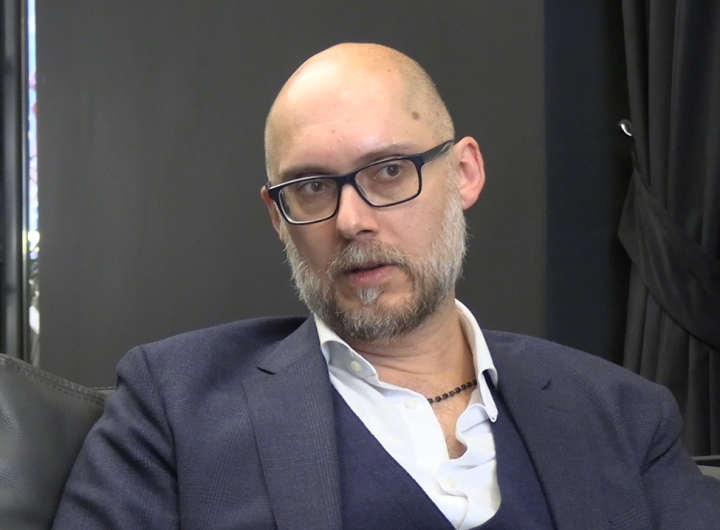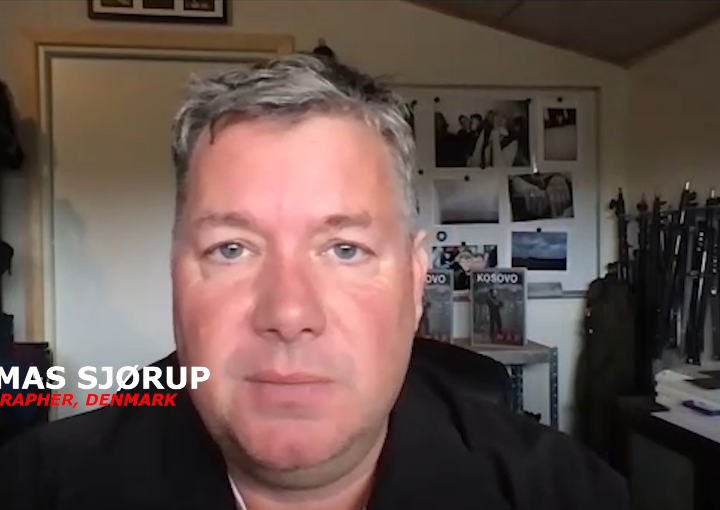
Ukrainians face intensified attacks and thousands of drones every day, and in addition to Russia’s war of aggression, they also face another front, Russian disinformation. This is what Olha Danchenkova, co-founder of the “Calibrated” organization in Ukraine, says in an interview with The Geopost. She emphasizes that Russian psychological operations and disinformation directly target the emotions, trust and morale of the population.
About 60% of Ukrainians, according to a recent study, remain susceptible to manipulation, she says, among other things.
Full interview:
The Geopost: Can you tell a little bit about the situation now in Ukraine?
Danchenkova: So thank you for having me. And really, Ukraine lives in the fourth year of the full -scale invasion, but decades long of Russian information operation and hybrid warfare. It’s been longer even than that. It is the active part of war. But now it is a war of attrition, and all people are feeling it in their bones, in their minds. Every day you wake up, every night you wake up to the new information that the strikes are being intensified.
There used to be hundreds of Shahed drones, now thousands of Shahed drones. And this info space is really populated by Russian manipulative psychological operations, targeting the resolve, the feelings of people. Before we can even think, we feel. And these feelings, they go beyond the cognitive warfare. This is emotional, carousel of emotion. The recent research published in Ukraine about disinformation showed that about 60 % of Ukrainians are ready to believe manipulative statements.
It’s been a questionnaire, true or false, it’s practical. It’s not just self -assessment that I think I am good, I don’t know anything, I know truth from false, but it is a real test. It showed that the majority of population is still vulnerable to disinformation, but Ukraine still stands strong. How is that? Because we are finding ways of fighting fear with humor, fighting, memes, songs, content that really helps to deal with fear, anxiety, and also content that gives us belief that we are in power to win, like Operation Spiderweb or this targeting Russian airbases back inside Russia shows that the examples, actions, that are really showing that Russia is not as strong. It is a paper tiger, but how do we is communicated, this is the most important thing, is how we perceive this message. So, we can see that Russia has not achieved a full victory of Ukraine in more than three years. It’s such a big country. It did not achieve dominance on kinetic battlefield, so, it tries to win us in psychological battlefield, it targets us with missiles that are narratives, that go inside our phones and it’s delivered to every and each citizen of Ukraine. So, Ukrainian StratCom, civil military resilience groups, grassroot initiatives, they all come together to build this inoculation to explain, say, to parents how their children, teenage children can be recruited by Russian saboteurs through telegram to set on fire military trucks.
They, Russians, they put their stakes on undermining trust in authorities. So, people don’t believe the government, don’t believe armed forces. So, people feel hopeless that they are abandoned by allies, that NATO will not help you. Allies have abandoned you. You are a failed state. This is exactly the tactic that they are targeting daily, through news, through real acts of sabotage, through cyber operations. So, our preparedness as Ukrainians lays on crisis communication Resilience, even when the Ukrainian operator of a railway was targeted by cyber-attacks and millions of people couldn’t get a train because the online ticketing system was down. You can imagine what chaos would be in the country if we were not prepared for that, if the communication team and risk management team was not ready to put messages in Instastories, in every channel of social media, to explain people what to do, because we were prepared. And this is my message to our European colleagues, allies. Get prepared, get ready to be targets of Russian hybrid attacks, because they are already attacking your civilians through social media, through cyber-attacks, through disinformation. They will be undermining your resolve.
And it’s up to you, up to your government to decide how strong you are, how ready you are, because you will be attacked, but you can be prepared. And Ukraine’s example shows that you can still stand your ground, you can still be ready for this. And yes, there will be casualties. I mean, in cognitive space, there are people who will believe these narratives, amplified by AI, they are everywhere on TikTok, on Instagram, it’s flooded. If you have heard it a hundred times, you maybe start believing it.
But Our resilience and our preparedness builds another storytelling, more powerful, more engaging storytelling about the projection of future that we are all creating. It’s empowering each and every person that you are part of this, part of the resistance, part of the resilience. Every one of us, if you see a manipulative statement that makes you feel Oh, my attention is rising, I want to share, I want to repost. This is 99 % it is a manipulation if you feel this kind of statement. So, you all can resist at this level and double check what you share, who you believe.
/The Geopost

 Russia is using disinformation to influence Western democracies
Russia is using disinformation to influence Western democracies  “Disinformation is becoming more sophisticated,” Alexandre Alaphilippe talks about global challenges and the role of AI
“Disinformation is becoming more sophisticated,” Alexandre Alaphilippe talks about global challenges and the role of AI  Paolo Palumbo: Russia is strengthening disinformation campaigns through artificial intelligence
Paolo Palumbo: Russia is strengthening disinformation campaigns through artificial intelligence  Professor Iztok Prezelj: Balkans influenced by external powers, Serbia serves as an entry point for Russia
Professor Iztok Prezelj: Balkans influenced by external powers, Serbia serves as an entry point for Russia  Kosovo through the lens, interview with the photojournalist of 1999
Kosovo through the lens, interview with the photojournalist of 1999  Djukic for The Geopost: There is a civil war in Serbia, the final outcome will be known in a few weeks
Djukic for The Geopost: There is a civil war in Serbia, the final outcome will be known in a few weeks